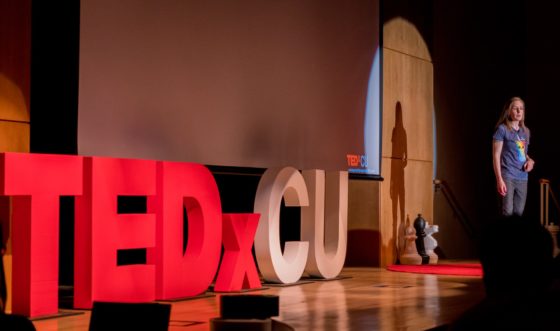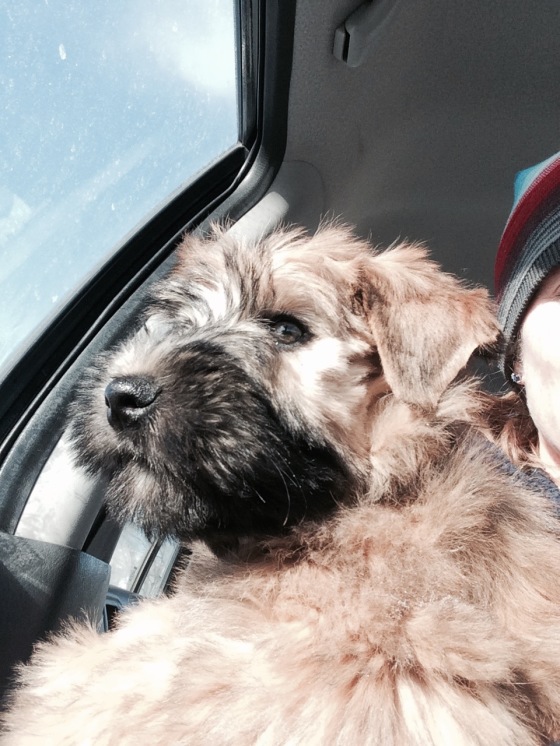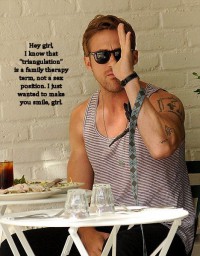I could see the audition room from the nook I had found in an effort to pull myself together. Located in a university library, the room looked like a small study space. Given my long history with such rooms, my mind said the familiarity should bring some comfort. My nervous system vehemently disagreed. I tried several tricks of the trade to calm my internal anarchy: deeply and slowly breathing with a loooooong exhale, holding a river rock in my hand to ground and center my body, huffing lavender essential oil, asking my fear brain to chill out (with lovingkindness, of course). None of these things worked. My body decided this place was engulfed in flames. The only way to help me survive was by furiously signaling that I needed to get the hell out of there. My mind, of course, refused to listen. Too many hours spent crafting, editing, and memorizing five minutes of speech meant the most stubborn part of me dug in her heels. I was staying unless or until something catastrophic happened.
The five interviewers arrived, and I walked into the audition shaky and about to pass out. In that moment, the past performances and travails I successfully navigated in this lifetime disappeared from the map. So what that I had given a commencement address in the not-so-distant past in a large stadium. Never mind that even more recently I made it through the trauma of lying naked on an operating table for a dreaded c-section. Somehow, the task of auditioning without notes disabled the parts of my brain that knew how to do something besides freak out.

Sure enough, while delivering my five-minute talk, I flipped my lid, to borrow from Dan Siegel. The words disappeared, completely. Erased from the white board of my mind. If I had not had some PowerPoint slides to cue me, I could not have retrieved the speech to save my life. I walked out of that library convinced that my anxiety would forever squander my dream of giving a TED talk. I simply was not cut out for this kind of performance.
Herein lies my first lesson: do not believe what your inner critic tells you.
As a recovering perfectionist and academic, I know my critical manager intimately. When she senses danger, she takes over like a boss. Despite knowing about her tendency to dominate unsafe spaces, I heeded only her voice after leaving that audition room. I believed hook, line, and sinker that I had been an unmitigated disaster. I would hear nothing from the TEDxCU committee except that my idea was not worth spreading.
I therefore felt incredulous when I received an invitation to speak at the 2018 event. After accepting the invitation, I shared the intensity of my audition nervousness with one of the interviewers. She said it was not evident to her; rather, I clearly had invested a lot of time and energy on rehearsing my speech, and that showed. Once again, my mean-spirited protector had cast only shadows. I usually imagine this critic as a bright red lobster. By forcefully pointing out the flaws she deemed in need of correction, she thought she was helping. But this old, brow-beating strategy, taught and learned at a much earlier time in life, when I encountered criticism at nearly every turn, no longer serves. The work of unlearning the harsh tales this critic effortlessly weaves is worthwhile, even if it takes a lifetime.
After recovering from the shock of appearing on the TEDxCU speaker roster, I encountered my next lesson: persistence highly correlates with triumph.
This TEDx gig reminded me of an interview with author Kate DiCamillo. DiCamillo collected nearly 400 rejection letters on her way to becoming a Newbery medalist. About persistence, she wrote,
I've been in so many writing workshops, writing classes, and to the right of me and to the left of me, there's always somebody much more talented than I am. And what I figured out is they're not willing to go through the rejection, which is enormous, and then the compromise that comes with editing your work. I decided a long time ago that I didn't have to be talented. I just had to be persistent, and that that was something that I could control — the persistence.
When I learned I would be climbing onto the TEDxCU stage, my immediate thought was, I cannot give this talk without notes. I knew in my bones that having my written speech in hand constituted the one and only way for me to me to speak to a public audience, with cameras rolling, for longer than 10 minutes.
One of the most useful practices I have as a psychotherapist is knowing how to distinguish survival resources from creative resources. As it turns out, helping others to discern one from the other tends to be easier than doing it for ourselves. Survival tools helped us to get through something. The issue with them is that we keep using these resources past the time they benefit us. We know they have become a survival resource when they make our world smaller. Creative resources, on the other hand, open up our world. They motivate us to get out of bed in the morning and wholeheartedly jump into life. Sometimes creative resources morph into survival ones, and vice versa, as life circumstances change. In my past, notes had helped me to publicly defend a dissertation, give numerous academic and professional presentations, and teach college classes. I now sensed I needed them, and my utter dependence on notes transformed them into a survival resource.
So when I approached one of the people who was guiding us through this TEDx process about using notes on the day of the event, he told me in no uncertain terms, "If you go on stage with notes, you will be the only one who does so." Although I did not particularly appreciate this feedback, it helped me to identify that my attachment to notes had moved me into the land of survival resources. Absorbing the reality that TEDxCU speakers were expected to give a memorized talk set me on a path of figuring out what creative resources could allow me to give this talk without my beloved notes.
For example, I read Tim Urban's post on doing a TED talk and learned that memorizing the talk to the point of being able to recite it like "Happy Birthday" allowed speakers to focus on other things than the speech's content--like being present and engaged. As he wrote, "[T]he human brain is able to engrave things to that level if you just rehearse enough and sleep on it enough times." Now I had a concrete goal toward which I could work, which assuaged some of my anxiety. I also had a lot of work to do to realize that aspiration, which is where persistence comes in. Any time I could manage to practice the talk, I did--in the shower, during my commute to work, while cooking a meal. After my toddler went to sleep at night, I not only practiced the talk but also videotaped myself giving it as I got closer and closer to having it memorized cold. That damn talk involuntarily played in my head for days after the event it was so ingrained in my brain.
I also developed a plan B. Since my talk was all about suspending judgment, I figured that I would keep notes in my back pocket. If I went totally blank on stage, as I did in the audition, I could pull out my notes and talk about how this moment was not a failure but a growth opportunity. Embracing this alternative as a viable option caused the anxiety to drop precipitously.
Beta-blockers were another significant creative resource I sought out to persist with this goal of giving a TED talk. I am grateful to my psychopharmacology teacher from therapy school for de-stigmatizing what turned out to be an amazing aid for me. She casually mentioned that she took beta-blockers when giving a big presentation, and I tucked away this nugget of wisdom for future use. When I work with clients who are debating whether or not to take psychotropic medication, I frequently send them to mindfulness teacher Tara Brach's blog post on this topic. She brings compassion and wisdom to bear in acknowledging
...for some people, no matter how hard they try something else is needed to engender safety and bring anxiety to a manageable level...There are no absolute recipes for working with this issue of taking medications. In making choices on our path, it’s important to ask ourselves whether or not they will serve awakening and freedom. Our best answers are found by honestly looking into our intentions.
My deeper intention than completing this TED talk was to face and work through my fear of failure. The beta-blockers helped me to do that. Nevertheless, I persisted.

The final major lesson for me came after I gave the TEDxCU talk and began sharing it with the world: Do not take anything--and I mean anything--personally.
Intellectually, I knew this adage forward and backward. I frequently share with clients a favorite quote from a favorite chapter on not taking things personally:

Prior to giving the talk, I also explored with a therapist how to work with my fear of criticism from people in marginalized communities. I knew this talk was challenging the tendency in social justice circles to take a morally righteous stance. From testing out my ideas in various audiences, I surmised the probability was high that I might trigger a negative reaction from those I most wanted to support and least wanted to upset. When I checked in with myself, however, I felt clear about the importance of moving beyond right/wrong and good/bad dualities while challenging systemic harm. I would not diminish my truth out of fear.
Instead, I reflected long and hard on my words and invited feedback from various sources to ensure, to the degree I could, that my intentions lined up with the impact of my statements. But one cannot control another's response, which is, to again borrow from Ruiz, "a projection of their own reality." My next step was to work on accepting that others' reactions to my talk were beyond my control.
Additionally, I used a trauma therapy technique of imagining my protectors, nurturers, and wise guides were in the room with me as I gave my talk. The owls and hawks I frequently see with my child during evening walks in Colorado were flying amongst the audience, creating a safeguard between harsh critics and me. On the stage, the many courageous activists, teachers, and spiritual guides I have been lucky enough to encounter in this lifetime stood alongside me, reminding me that I was not alone. They also wisely reinforced that these ideas were not mine; they were shared ones borne of our interdependence.
Even with all this preparation, a mean-spirited online comment about my talk from a stranger on a queer parent Facebook page cut me to the quick. I could not get it out of my head. Yes, this was a virtual community of virtually unknown people, but I still had a sense that it was my community, and someone within it slammed me. What most helped me to come out of the turtle shell into which I was fast retreating was David Wong's article, "Why You're Being Kept In a Constant State of Impotent Rage." In it, he acknowledges the new frontier onto which we have entered:
...this system has a magical way of making even a hugely successful person feel helpless, because they're being attacked by nobodies who lash out because they also feel helpless. This helplessness comes from being raised to expect things from the world that it can't actually give you....if you are a public person in 2018, you will at some point be used as a punching bag by a bunch of strangers. That's the purpose you'll serve in their life, a thing they can hate without risk, and then forget about. It's part of the tradeoff of being a public person, and oh by the way, in the social media era, everyone is a public person.
In addition to placing the Facebook comment into a larger sociocultural framework and, so, depersonalizing it, this article brought me back to a central intention of doing this TEDxCU talk in the first place: to interrupt the helplessness that so many of us feel and that often spurs more violence and abuse. Ironically, the talk's central theme played out in a social media thread about the talk itself. At least the talk had some relevance, I suppose!
For those of you out there who absolutely believe you cannot realize an important dream, I hope you will dig beneath the self-doubt, turn away from the internal and external naysayers, and look around to see if untapped resources within and around you can bring that vision to life. Since I love an inspiring quote, here is one from Maya Angelou, "My life has been long, and believing that life loves the liver of it, I have dared to try many things, sometimes trembling, but daring still."
[embed]https://www.youtube.com/watch?v=J0_6b-AJdWU&t=603s[/embed]

 This little lady has taken up more of my time these days, which is the main reason I have not been writing as much or as often. I thought I'd share the cuteness because hey, who doesn't like a puppy? I also wanted to introduce Hazel because the goal is for her to become part of my therapy practice when she's a little older. In the meantime, I have been thinking about the following:
This little lady has taken up more of my time these days, which is the main reason I have not been writing as much or as often. I thought I'd share the cuteness because hey, who doesn't like a puppy? I also wanted to introduce Hazel because the goal is for her to become part of my therapy practice when she's a little older. In the meantime, I have been thinking about the following: